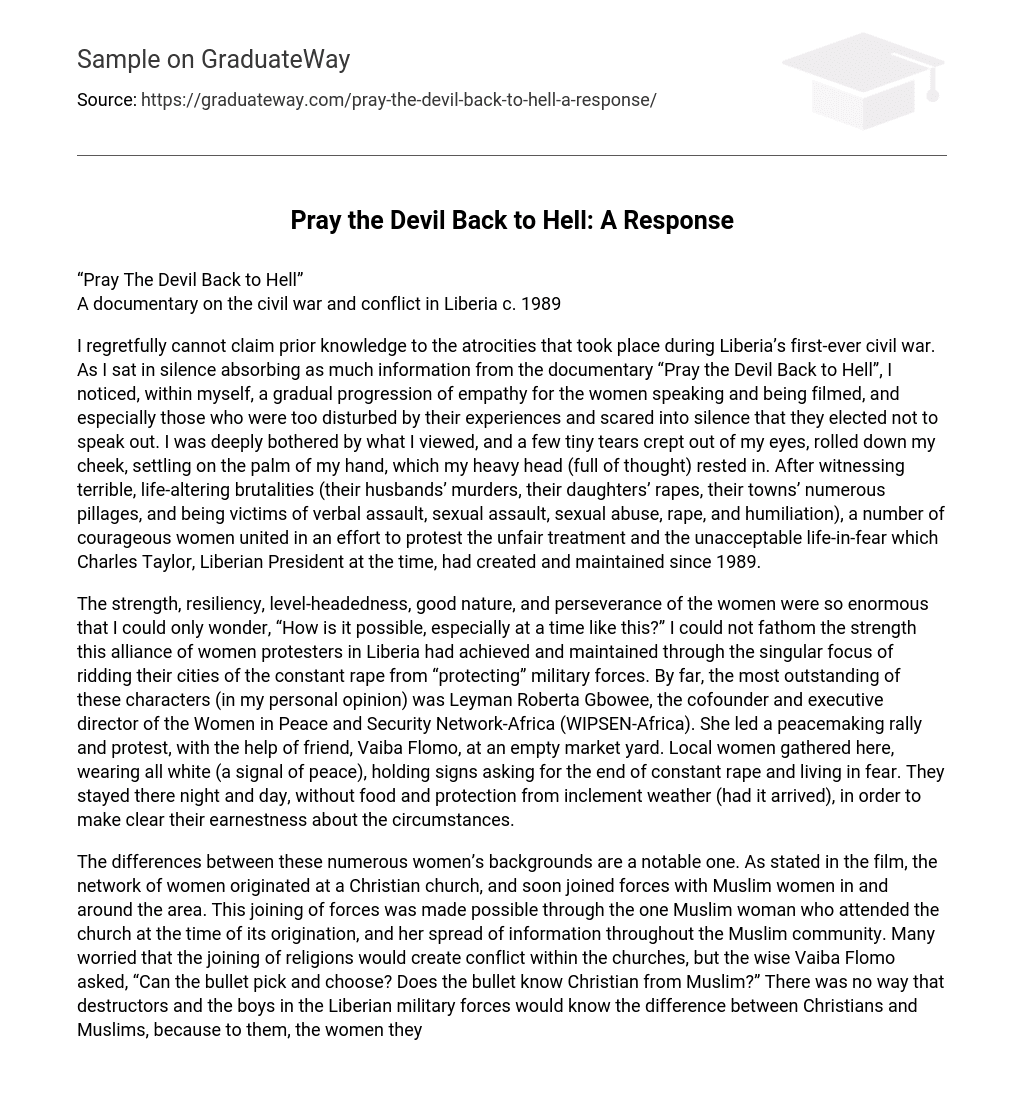“Pray The Devil Back to Hell”
A documentary on the civil war and conflict in Liberia circa 1989.
While watching the documentary “Pray the Devil Back to Hell”, I gained a greater understanding of Liberia’s first civil war. The film introduced me to the women who had experienced unimaginable suffering, such as the murder of their husbands, rape of their daughters, pillaging of their towns, verbal and sexual assault, abuse, rape, and humiliation. Witnessing these heart-wrenching scenes deeply affected me and even brought tears to my eyes. However, despite their trauma, these brave women came together in protest against Charles Taylor – Liberia’s President at that time – who was responsible for perpetuating injustice and fear. Some were too traumatized to speak out about what they had endured but found comfort in this collective action.
The women in Liberia displayed immense strength, resilience, level-headedness, good nature, and perseverance. It amazed me how they were able to maintain these qualities during such challenging times. I couldn’t comprehend the immense strength of this group of women protesters who were determined to rid their cities of the constant rape by military forces who claimed to be protecting them. Among all these incredible women, Leyman Roberta Gbowee stood out the most in my personal opinion. She was the cofounder and executive director of the Women in Peace and Security Network-Africa (WIPSEN-Africa). Gbowee, along with her friend Vaiba Flomo, organized a peacemaking rally and protest at an empty market yard. The local women gathered there wearing all white, a symbol for peace. They held signs demanding an end to constant rape and living in fear. They remained at the market yard day and night without food or protection from bad weather, to demonstrate their unwavering commitment.
The diversity among the women is a significant contrast. Initially, the network of women originated from a Christian church and later merged with Muslim women in the area. A Muslim woman who attended the church played a crucial role in facilitating this merger by disseminating information within the Muslim community. Concerns arose about potential conflicts between the two religions within the churches, but Vaiba Flomo wisely questioned, “Can the bullet pick and choose? Does the bullet know Christian from Muslim?” The destructors and boys in the Liberian military forces did not distinguish between Christians and Muslims; they saw all encountered women as property to be taken. Despite their individual differences, these women were united by their mistreatment and torture. It was not about religion but morality. The interviews with these women were incredibly powerful and emotional. I empathetically felt their pain and suffering, wishing that in another life, I could join them in their determined fight for a life without constant fear and violence.
Women in Liberia, as well as other parts of Africa and the world, are not the sole victims of fear and uncertainty. People from various backgrounds face similar challenges due to war and patriarchal social structures. It is crucial to contemplate how this situation would be perceived without the context of war. In such instances, the international community would likely take swift action to halt these atrocities and form alliances against those responsible for crimes against the inhabitants.
Despite my frustration and confusion, I pondered why powerful transnational forces fail to unite and address the underlying cause of destruction. Over time, I discovered numerous factors that complicate this ideal scenario. Clearly, selfish motives drive these “evil-doers,” enabling them to achieve their objectives through physical strength and instilling fear. However, must we persist in this manner?
The war and its proceedings can benefit from a mindset shift, exploring different approaches to conflict resolution. It is important to acknowledge that physical strength is necessary for fighting against evil forces, but we must also reassess our efforts in preventing harm to innocent people. However, I admit that my current level of education does not allow me to fully delve into this complex issue.
Many individuals work tirelessly every day to address these problems and face the difficult questions they present. The world is filled with numerous factors that contribute to the various problems we encounter during our lifetime. Life is not as simple as we desire it to be.
Although the battles we personally, locally, or nationally face may find resolution within our lifespan, we often overlook the need for ongoing involvement and effort to sustain these accomplishments. Engaging in peacekeeping endeavors is crucial as it maintains a balanced power system controlled by governments and fosters a more pleasant life and environment.
Peace is not an event, it’s a process.
– Vaiba Flomo





